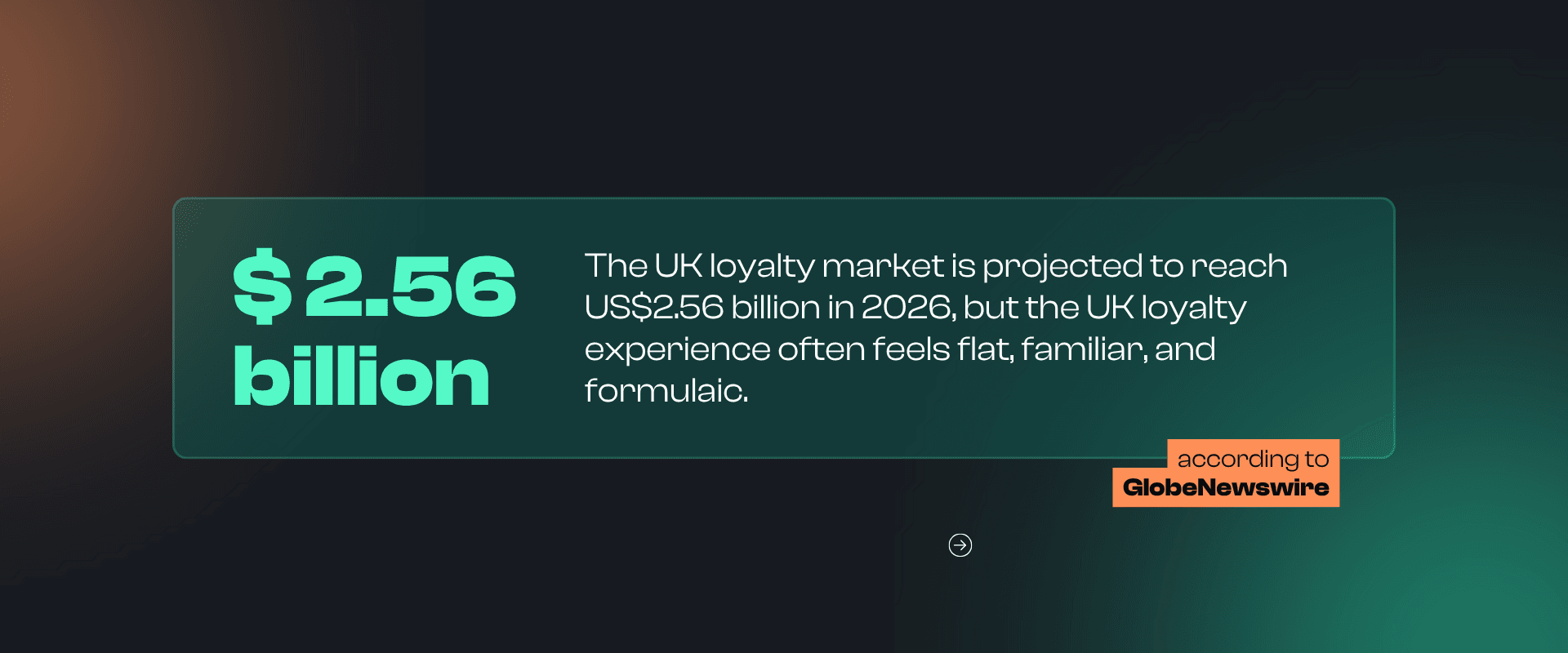The UK has always held a unique place in the global loyalty landscape. Its consumers are discerning, value-driven, and shaped by a retail culture where familiarity, trust, and service quality matter just as much as rewards.
Yet as the market evolves, the expectations of UK customers are shifting faster than many programmes can adapt.
Today, loyalty in the UK is about understanding people.
- What they value.
- How they shop.
- Why do they stay.
And in a market shaped equally by tradition and rapid digital growth, brands can no longer rely on one-size-fits-all mechanics to keep customers engaged.
As global loyalty models become more sophisticated, the UK’s challenge, and opportunity, lies in localising experiences that feel culturally relevant, emotionally resonant, and genuinely useful in the everyday lives of British consumers.
In this blog, we explore where UK loyalty is heading, why localisation matters more than ever, and how brands can build programmes that thrive in both a competitive domestic market and an increasingly connected global landscape.
Let’s dive in!
The UK Loyalty Paradox: Mature Market, Stale Strategies
The UK loyalty ecosystem is one of the most mature in the world, but in 2026, that maturity is becoming a double-edged sword.
Decades-old programmes still dominate the high street, yet their longevity is now the very thing limiting innovation. Around 70% of UK brands admit their loyalty programmes don’t offer a true USP, and it shows:

And the cracks are widening.
The UK Consumer Has Evolved Faster than the Programmes Meant to Serve Them
Recent research shows a striking split in loyalty behaviour:
- 47% of UK consumers say they’re loyal to stores, not brands.
- Only 6% feel loyal to specific brands online, where choice overwhelms habit.
- And poor customer service is the #1 deal-breaker, with 54% saying it breaks trust instantly.
This is not a minor shift; it’s a signal.
UK consumers are no longer impressed by programmes that look big. They want programmes that feel personal, valuable, and culturally relevant. They want recognition, immediacy, and utility. Not another plastic card or generic “£5 off when you spend £15.”
But UK brands are struggling to keep pace. Loyalty budgets represent only 26% of total marketing spend, trailing global benchmarks. In a market where expectations are rising and margins are tightening, underinvestment keeps UK loyalty anchored in yesterday’s playbook.
And yet, the global opportunity has never been bigger
What makes the UK paradox even more striking is that British consumers are uniquely open to emotionally driven loyalty. They value:
- strong in-store experiences,
- community belonging,
- convenience paired with personalisation,
- responsible brands that reflect their values.
These behaviours mirror larger global shifts for 2026. From “home as sanctuary” and community-centric engagement, to heightened expectations around trust and inclusivity.
This means UK loyalty brands aren’t just competing locally. They’re sitting on a model that, if modernised, can scale globally.
The UK’s retail and loyalty DNA is already internationally recognisable. What’s missing is the next leap. The shift from mature to modern.

The Next Wave of Loyalty: Partnerships, Product Value & Perks
As the UK loyalty landscape matures, customers are increasingly looking forward — and beyond the brand name.
In 2026, uniqueness, relevance, nostalgia… and everything in between will drive engagement. UK loyalty customers no longer focus on brands alone; they care about the products themselves and the emotions those products evoke.
With inflation shaping spending habits, UK consumers are making choices based on value, feelings, and purpose.
Now, loyalty for UK consumer is a mix between meaningful experiences, thoughtful rewards, and recognition that resonates with everyday life.

UK consumers have grown sceptical of loyalty programmes built on brand slogans and vague promises. What they want now is proof of value, not just presence.
Instead of pushing brand identity, loyalty programmes are shifting toward:
- Product-led rewards (incentives tied directly to what people actually use)
- Utility-driven features (quick reorders, frictionless payments, digital receipts, app shortcuts)
- Earn-as-you-use mechanics, where the experience itself becomes the reward
Retailers that used to focus heavily on brand loyalty are now doubling down on everyday usefulness:
The more relevant the product experience, the stronger the loyalty. Regardless of the name behind it.
The next step for UK brands looking to expand their loyalty domain in 2026, should be to build loyalty programmes built around behavioural utility.
Showing customers exactly why staying engaged makes their daily life easier or cheaper.
Coalition Loyalty Programs
Coalition loyalty, earning and redeeming across multiple brands, is gaining traction again in the UK.
Consumers increasingly gravitate toward ecosystems that simplify life, allowing them to:
- Build value faster
- Access a broader reward universe
- Move seamlessly between brands, categories, and touchpoints
Partnership-led loyalty offers convenience and perceived value, two major drivers for UK shoppers navigating tighter budgets and busier routines.
The challenge? Coalitions require shared data, aligned reward rules, and operational cooperation — areas many brands still hesitate to open up.
But in 2026, expect more cross-industry alliances spanning:
- Hospitality
- Grocery
- QSR
- Retail
- Travel
Loyalty is becoming a network, not a silo, and UK consumers are ready for it.
Revival of Classic Perks
In 2026, UK loyalty programmes are rediscovering the power of nostalgia. In uncertain times, consumers seek comfort in what they know: familiar rewards that feel reassuring and tangible.
- Classic perks like,
- Free coffee
- Cashback vouchers
- Birthday treats
- Store-specific bonuses
…still strike a chord, offering emotional connection and simplicity amid ongoing cost-of-living pressures.
Yet, today’s consumers are digitally savvy. They expect rewards to be:
- Seamlessly integrated across apps, websites, and in-store experiences
- Instant and easy to redeem, with no manual tracking
- Connected to digital wallets and loyalty accounts for real-time updates
The key for 2026 is blending nostalgia with modern convenience. Loyalty programmes that succeed will:
- Evoke familiarity and comfort through classic perks
- Deliver them through frictionless, tech-enabled touchpoints
- Ensure every interaction feels effortless, intuitive, and fast
In short, UK consumers now want the emotional warmth of the past, paired with the efficiency and speed of today’s digital experiences. Those who balance nostalgia with seamless technology will capture attention, engagement, and lasting loyalty.
Knowing Your Audience: Data Collection & Loyalty Technology in the UK
Collecting data is at the heart of every loyalty programme. To get to know your audience, you need to track what they purchase, what they pair with that item, when they shop, and how they engage with your brand.
The UK, with its diverse demographics, offers a significant opportunity for brands, allowing them to test different aspects of the market simultaneously. But with great power comes great responsibility, and the heavy regulatory environment means innovation can’t come at the expense of trust.
Over the past five years, the UK has introduced a series of regulations designed to protect consumers while enabling responsible marketing.
From GDPR to the Data (Use and Access) Act 2025, these frameworks establish clear rules around consent, data usage, and transparency.
- Automated decision-making allowed, but safeguards required, especially for sensitive data.
- DSARs must be handled reasonably and proportionately.
- The new lawful basis (“recognised legitimate interests”) expands processing, but rights must be protected.
- Cookies and trackers may need less explicit consent, depending on risk.
- International data transfers must meet “equivalent protection” standards.
- Transparency and accessible complaint mechanisms are mandatory.
For loyalty programmes, this creates both a challenge and a strategic imperative: brands must collect and use data in ways that are ethical, secure, and demonstrably beneficial to the customer.
In practice, this means shifting the focus from collecting everything to collecting what truly matters.
Loyalty programmes need to,
- Track meaningful behaviours rather than every click or purchase.
- Integrate AI in ways that feel helpful, not invasive, predicting rewards without overstepping.
- Ensure mobile, in-store, and app touchpoints are seamless, giving customers control and visibility over their data.

In the hybrid UK market loyalty programmes that respect privacy while delivering seamless convenience will stand out in 2026 and beyond.
Ultimately, the most successful loyalty strategies will blend technology, ethics, and insight: collecting the right data, using it responsibly, and delivering experiences that feel natural, rewarding, and trustworthy.
The Future of UK Loyalty is Local, Emotional, and Smart
The UK loyalty market has always been rich with tradition, but 2026 demands more than heritage. Consumers are no longer impressed by scale or brand names alone.
They seek value, emotion, and seamless experiences that fit their daily lives.
Loyalty programmes that win in the UK will:
- Focus on products and experiences, not just logos
- Blend nostalgia with frictionless digital touchpoints
- Leverage partnerships and coalition networks to expand value
- Use data responsibly to anticipate needs without compromising trust
For brands, the opportunity is clear: evolve beyond “good enough,” embrace local relevance, and design programmes that feel personal, useful, and emotionally resonant.
Those who strike this balance won’t just retain customers, they’ll build lasting loyalty that resonates at home and can scale globally.
Ready to modernise your loyalty strategy? Kaizen helps brands design digital loyalty ecosystems that connect emotional value with actionable insights, turning everyday interactions into lasting relationships. Take the next step. Start your future today!




